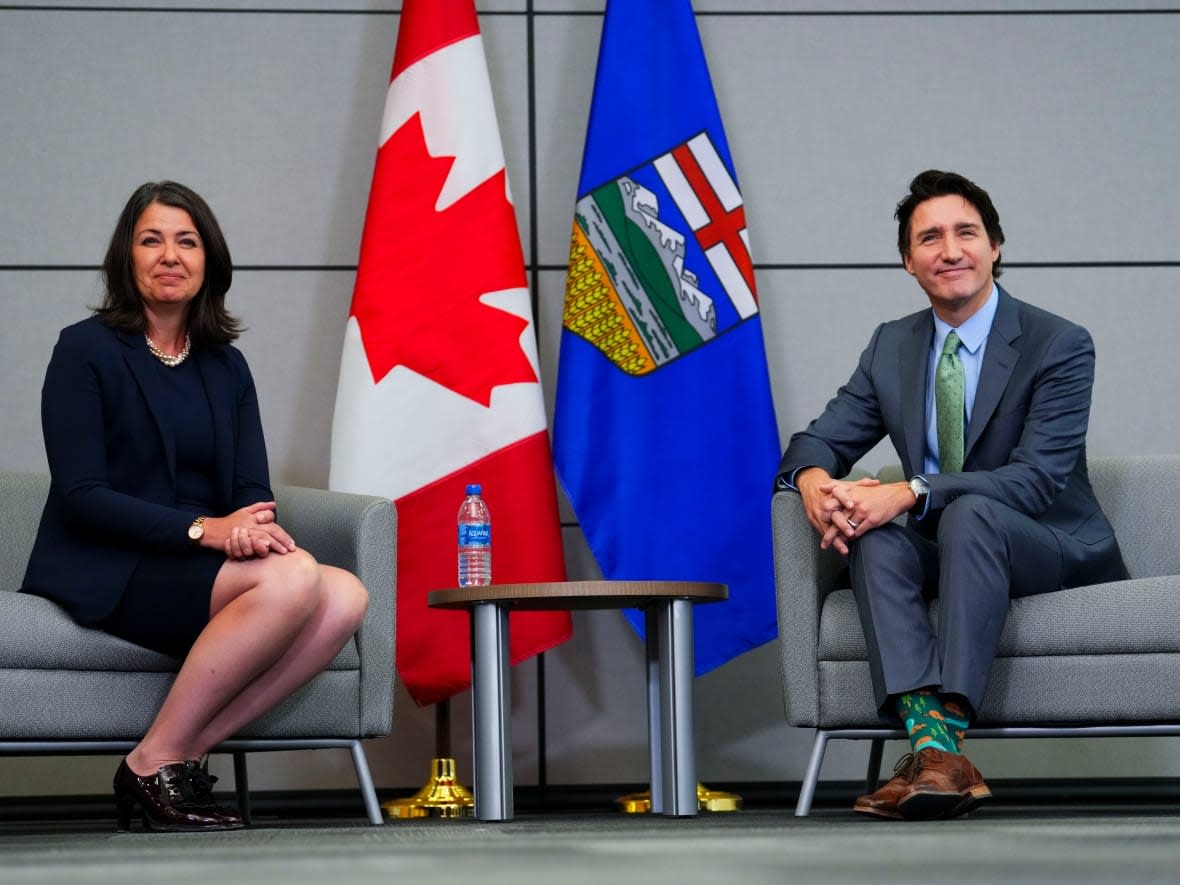Alberta premier willing to collaborate on climate issues if Ottawa meets 'non-negotiable' conditions

Alberta's premier has penned a letter saying she will collaborate with Prime Minister Justin Trudeau on certain climate and energy-related initiatives — if Ottawa agrees to certain terms.
The letter comes after Alberta Premier Danielle Smith and Trudeau met on Feb. 7, during which Smith said the prime minister expressed a willingness to collaborate on attracting investment and workers into Alberta's energy sectors while reducing Canada's and Alberta's net emissions.
In the letter released Thursday, Smith said the province is prepared to work with the federal government on a coordinated approach for a carbon capture, utilization and storage incentive program for the purpose of net emissions reductions.
But that coordination comes with a "non-negotiable condition," Smith wrote.
The premier wants Ottawa to refrain from introducing new federal legislation or policies that would impact Alberta's oil and gas resource development, management or workforce participation without the "full involvement, consultation and consent of Alberta."
Smith said the condition includes "just transition" legislation and implementation of targets and measures under the federal Emissions Reduction Plan.
"Just transition" is a concept that emerged from the 2015 Paris Agreement, an international treaty on climate change. The goal is to reduce the harm to workers caused by economies moving from high-carbon activities into the green economy.
It's not the first time Smith has penned an open letter to the federal government — just weeks ago, prior to her meeting with Trudeau, Smith wrote to the prime minister on the same issue.
Lisa Young, professor of political science at the University of Calgary, said in the most recent letter Smith has set out conditions that would be fairly difficult for the federal government to meet if they're going to achieve their own policy objectives.
"It's essentially saying that Alberta should have a veto over any actions that the federal government takes in this sphere," Young said.
Young added that she thinks trying to introduce a precondition isn't the best way to start a conversation, but it does speak to the fine line Smith has to walk.
"On the one hand, there are Alberta voters who would like to see her behaving in a more conciliatory manner toward the federal government," she said.
"But at the same time, having a significant part of her base that wants to see her standing up to Ottawa and drawing a line in the sand."
Lori Williams, associate professor of policy studies at Mount Royal University, said Smith has been vocal in advancing her view of what the federal government's involvement is in areas that she considers to be provincial jurisdiction.
"Frankly, some of the concerns that she's raising are ones that Albertans broadly speaking would share," she said.
Alberta NDP energy critic Kathleen Ganley issued a statement in response to the letter Thursday, saying the premier "should have been at the table months ago" advocating for well-paying jobs.
"Instead, she's been focused entirely on reckless and extreme ideas, and hasn't prioritized the needs of the energy sector or the people of Alberta."
Alberta NDP leader Rachel Notley has also previously said she wants the federal government to drop the "just transition" legislation it plans to introduce.
Alberta appoints oilpatch veterans to advise on energy future
Also on Thursday, Smith announced the appointment of a panel of five oilpatch veterans to advise her government on the future of Alberta's energy industry.
The panel will be chaired by David Yager, a longtime writer on the oilpatch.
Yager was also a former political candidate for the Wildrose Party, one of the groups that came together to form the United Conservative Party that Smith now leads.
The other members of the panel include Hal Kvisle, who sits on the board of Cenovus Energy and has run several other energy companies.
Bob Curran is a former director of the Alberta Energy Regulator.
Carey Arnett is president of Arnett and Burgess Pipeliners and
Phil Hodge is the president of Pine Cliff Energy.
The panel is to meet with government ministries and industry stakeholders, although Smith makes no mention of public consultation or outside experts.
Smith says the panel is to advise the government on how Alberta can meet the world's future energy needs and a final report is to be completed by June 30.


